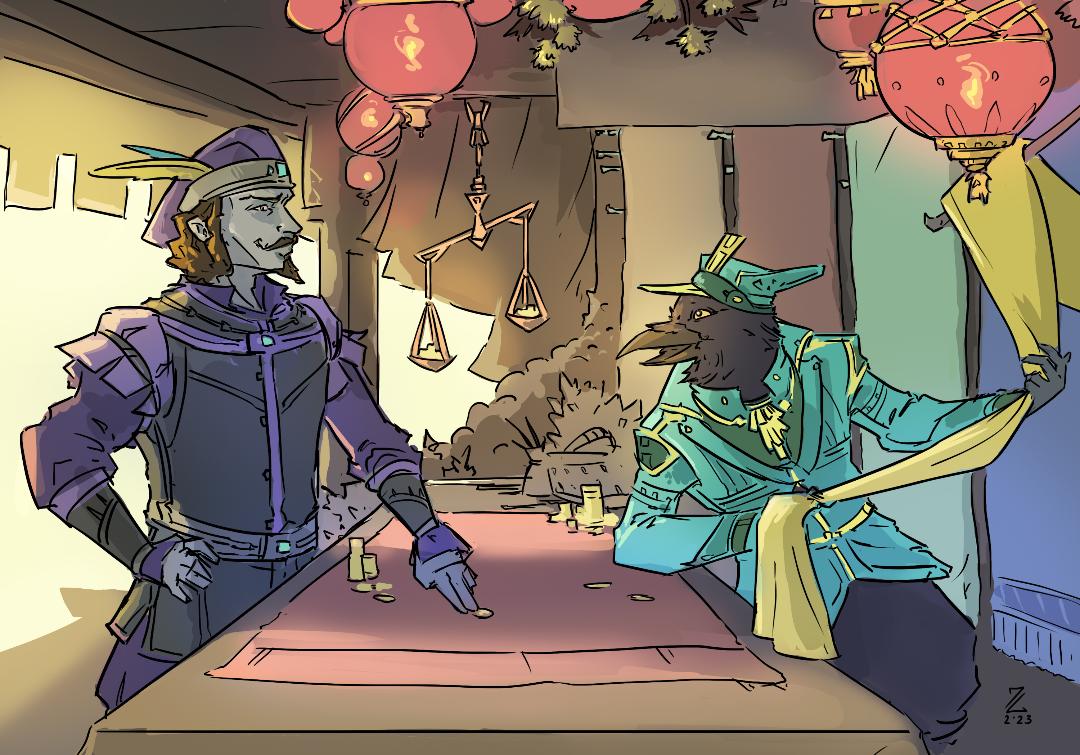I reference
How much money do Scarterrans make? in underlined portions. That covers money coming in. Lifestyle considers money coming in.
Generally speaking, about 68% of Scarterra's population is "Working Poor" or "Struggling", 20% is "Moderate" 10% is "Well-Off" and about 2% is "Rich"
These are guidelines, not rules. 10 copper pieces a week qualifies as "Working Poor" and 20 copper pieces a week qualifies as "Moderate". That doesn't mean no one is spending 15 coppers a week on their food, shelter, and creature comforts, many people are. On a similar token, there are many level of rich, but it would beyond the scope of this article to cover the differences between modest rich people and mega-rich people.
Moving Between Levels
There is some mobility between the classes. Poor people can pick up valuable trades and move up. People with valuable trades could find demand for their services dry up, forcing them to work for lower wages.
A lot of rich people have to make due with less than a "well-off" lifestyle if they hit hard times. If a tradesmen becomes famously skilled in his field, he can command higher wages, possibly enough to push his family up a lifestyle class but if the demand for that trade drops, then their lifestyle can drop.
Family dynamics can push a family up or down the chart.
A farmer or tradesman as the head of a family with several children under eight years old has a lot of mouth to feed he has to support entirely on his own, but fast forward ten or twelve years, his adult children can contribute decent income on their own without a large increase in expenses. Than that same head of household can afford to move up a bracket. But then when his adult children marry and move away, he is back down a peg.
At a certain point, the ravages of time kick in and an elderly person can not get as much work done, or at least cannot command the same wages he could in his prime.
Adventurers are in an odd position in society, at least successful adventurers are in an odd position. Unsuccessful adventurers tend to die or give up.
Normally, adventurers do not make a steady income, they usually make nothing for long periods of time and periodically receive very large windfalls of treasure. The rest of the time, they are only spending money.
A few regular working men have something vaguely similar. A world-class trainer and breeder of horses makes a lot of money when she sells a fully trained warhorse, but this only happens a few times a year. The rest of the year he has to feed and herself, her family, and her horses. Note that the costs below are for living expenses for
people, they don't include upkeep of livestock or other business expenses.
Though the above example would be an independent horse breeder. In a lot of cases, a horse trainer/breeder is not going to own any horses and in fact work for a lord and
his horses. The lord would pay his horse trainer a regular weekly or monthly salary and keep all the profits when a trained horse is sold.
Struggling
5 copper pieces a week
20 copper pieces a agriculture month
40 copper pieces a zodiac month
360 copper pieces a calendar year
An unskilled laborer can pay for this working 2.5 days out of 7.
This is the normal lifestyle of the especially poor and destitute with limited to nonexistent employment options. Working class poor can easily slide into this lifestyle if they have several dependents.
The individual sometimes has to make due with low quality food, sometimes barely passable food, sometimes going hungry. The character probably frequents
Scarterran Hospitals and other charitable institutions regularly as part of his or her lifestyle.
The character probably wears threadbare rags and likely doesn't have shoes.
The character probably sleeps in hospitals or in animal stables or other fairly cramped or unsanitary conditions.
No one probably expects donations or taxes from this character, but they are likely to frequently fall victim to the criminal element.
Working Poor
10 copper pieces a week
40 copper pieces a agriculture month
80 copper pieces a zodiac month
720 copper pieces a calendar year
An unskilled laborer can pay for this working 5 days out of 7.
This is the normal lifestyle of unskilled laborers or common tenet farmers. Higher income people often live this lifestyle if they have multiple dependents.
The character does not live luxuriously, but enjoys a modicum of stability. She rarely has to worry about going hungry, but she probably eats fairly repetitive and boring meals.
The character wears simple and probably patched up clothes and shoes but can more or avoid the dangers of the elements where he or she lives.
The character probably shares a bed with other people (who may be strangers if he is staying in an inn or similar public housing location) or sleeps on a simple mat on the floor. Sanitation is not good, but the character is probably not living in serious danger of disease, unless there is a local flair up with a plague or the like.
Moderate
2 silver pieces a week
8 silver pieces a agriculture month
16 silver pieces a zodiac month
144 silver pieces a calendar year
A typical ●● tradesmen can make this in two days, so working six days a week, he could take care of two non-working dependents and gradually build up a small rainy day fund. A ●●● tradesmen can theoretically make twice this and thus support a family of six at this lifestyle.
This is the typical lifestyle of skilled laborers or yeoman farmers. Higher income people sometimes live this lifestyle if they have multiple dependents or only have intermittent demand for their work.
This is similar to the working poor but the character enjoys a bit more privacy and cleanliness. The character still wears fairly simple clothes, but probably has enough extra clothes to wear cleaner clothes routinely.
The character enjoys consistent meals which is more than bread or porridge and vegetables. The character likely has meat, fish, dairy products and/or eggs almost every day and can enjoy roasts and sweets on feast days.
The character probably sleeps on a straw bed, but at least she doesn't have to share a bed with strangers. The straw gets changed often enough and the character bathes semi-regular so at least the character is relatively free of fleas and the like.
The character likely has to pay moderate taxes if they are a laborer. If they are a farmer, they probably have to pay a set percentage of their harvest to their lord. Characters at this lifestyle level are going to face some social stigma if they don't make regular donations to the Nonagons which is factored into the costs.
Well-off
4 silver pieces a week
16 silver pieces a agriculture month
32 silver pieces a zodiac month
288 silver pieces a calendar year
A merry bachelor or spinster can support this lifestyle for his or her self working a ●●● trade a mere two days a week. Six days a week of work could support a family of five at this level.
This is default life style for characters with exceptional professional skills, very successful merchants or the lower end of the nobility such as skilled courtiers or knightly families. A lot of non-inheriting nobles are groomed for professions that let them maintain this lifestyle.
Sometimes landed nobles can easily fall into this lifestyle if their hit by hard times. Many nobles are land-rich but coin-poor or otherwise have lots of debt from war or other mishaps.
The character eats fairly well, regularly enjoying meat, sweets, fine drink, and fine spices. The character probably sleeps on linen sheets, and enjoys fashionable clothes. The character probably has a servant or two.
Characters at this income level are expected to make showy donations to the Nonagon and/or "the small folk" periodically to maintain social face. At this level, the line between paying taxes and bribing officials is often blurred, but either way a character is likely to suffer negative consequences if they don't pay. This is already factored into cost of living.
Rich
8+ silver pieces a week
32+ silver pieces a agriculture month
64+ silver pieces a zodiac month
576+ silver pieces a calendar year
A ●●●● Master playing a trade could support this lifestyle for his or herself working two days a week, which is realistic, since ●●●● tradesmen are not likely to find customers for their services every day, but a master with a high demand skill working six days a week could pull in 30 silver a week, supporting four people at the beginning level of wealthy.
The character lives an extravagant lifestyle. Few can maintain this for long. Even landed nobles often struggle to maintain this lifestyle with a majority falling somewhere between "Wealthy" and "Well-off".
Wealthy characters eat the finest food, live in the finest homes, and wear the finest clothes. Wealthy characters are regularly expected to show overt generosity, making large Nonagon donations, sponsoring plays, festivals, public art, or war ships.
Wealthy characters are likely to periodically throw extravagant parties and feasts for their peers and receive similar invitations in return. This generosity often comes with informal political power, even if the wealthy character has no noble claim or title.



Comments